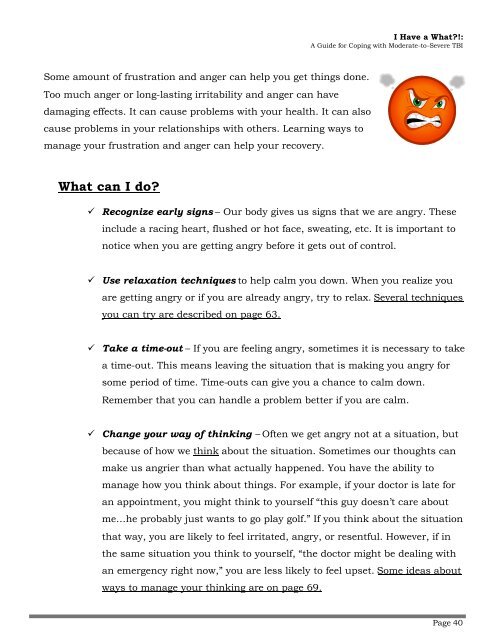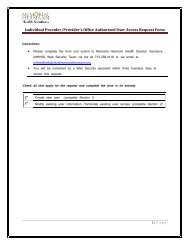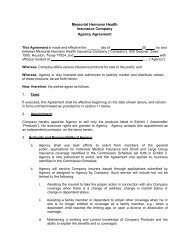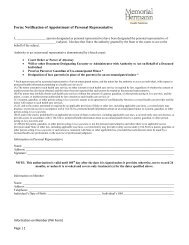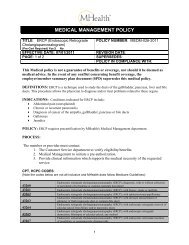I Have a What? A Guide for Coping with Moderate-to-Severe TBI
I Have a What? A Guide for Coping with Moderate-to-Severe TBI
I Have a What? A Guide for Coping with Moderate-to-Severe TBI
- No tags were found...
You also want an ePaper? Increase the reach of your titles
YUMPU automatically turns print PDFs into web optimized ePapers that Google loves.
I <strong>Have</strong> a <strong>What</strong>?!:A <strong>Guide</strong> <strong>for</strong> <strong>Coping</strong> <strong>with</strong> <strong>Moderate</strong>-<strong>to</strong>-<strong>Severe</strong> <strong>TBI</strong>Some amount of frustration and anger can help you get things done.Too much anger or long-lasting irritability and anger can havedamaging effects. It can cause problems <strong>with</strong> your health. It can alsocause problems in your relationships <strong>with</strong> others. Learning ways <strong>to</strong>manage your frustration and anger can help your recovery.<strong>What</strong> can I do?Recognize early signs – Our body gives us signs that we are angry. Theseinclude a racing heart, flushed or hot face, sweating, etc. It is important <strong>to</strong>notice when you are getting angry be<strong>for</strong>e it gets out of control.Use relaxation techniques <strong>to</strong> help calm you down. When you realize youare getting angry or if you are already angry, try <strong>to</strong> relax. Several techniquesyou can try are described on page 63.Take a time-out – If you are feeling angry, sometimes it is necessary <strong>to</strong> takea time-out. This means leaving the situation that is making you angry <strong>for</strong>some period of time. Time-outs can give you a chance <strong>to</strong> calm down.Remember that you can handle a problem better if you are calm.Change your way of thinking – Often we get angry not at a situation, butbecause of how we think about the situation. Sometimes our thoughts canmake us angrier than what actually happened. You have the ability <strong>to</strong>manage how you think about things. For example, if your doc<strong>to</strong>r is late <strong>for</strong>an appointment, you might think <strong>to</strong> yourself “this guy doesn’t care aboutme…he probably just wants <strong>to</strong> go play golf.” If you think about the situationthat way, you are likely <strong>to</strong> feel irritated, angry, or resentful. However, if inthe same situation you think <strong>to</strong> yourself, “the doc<strong>to</strong>r might be dealing <strong>with</strong>an emergency right now,” you are less likely <strong>to</strong> feel upset. Some ideas aboutways <strong>to</strong> manage your thinking are on page 69.Page 40


